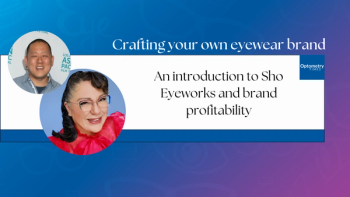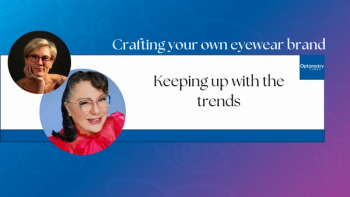
- August digital edition 2024
- Volume 16
- Issue 08
Education is power: Learning from the best at EyeCon 2024
Diabetic eye care expert A. Paul Chous, OD, MA, FAAO, shares insights on patient care and research.
Diabetes care is often personal, and that is certainly the case for A. Paul Chous, OD, MA, FAAO, co-chair of EyeCon 2024. A large portion of his career has been dedicated to research in diabetic eye disease and care of patients with diabetes, and Chous is excited to share more with the attendees of EyeCon. Along with Peter J. McDonnell, MD; Tosin U. Smith, MD; and Kelly K. Nichols, OD, MPH, PhD, FAAO, Chous will chair the 4th annual EyeCon on September 27-28, 2024, in Fort Lauderdale, Florida.
Note: This transcript has been edited for clarity and length. The full interview can be found online.
Emily Kaiser Maharjan:
I know that one of your passions is diabetes, eye care and education. Do you have any favorite studies or pet projects that you have tackled over your career that you are particularly fond of?
A. Paul Chous, OD, MA, FAAO:
Well, I spent about 10 years of my life working on this one study looking at a nutritional product for diabetic retinopathy. It showed some efficacy, got published in a prestigious journal, so that was cool. But the highlight for me is I got to the ARVO diabetic retinopathy meeting to present a poster. A lot of the people that had been professional heroes of mine were speaking at this meeting. I got to go to the National Institutes of Health Campus. I'd never been there, and it was humongous, like a big university, and it was totally cool. That was one of the highlights of my career revolving around diabetes. And then, of course, when I got success stories and a few catastrophes with patients that I've seen over the years, but I have a lot of patients that come to me because they want more education about diabetes. A lot of primary care doctors, even endocrinologists -- I'm a patient also, I've had diabetes 55 years -- the doctors don't spend enough time really educating patients and there is a thirst out there for knowledge. I think optometrists and ophthalmologists both can really play an important role.
Kaiser Maharjan:
Touching on that education angle, what we know about diabetes and diabetes care and diabetes eye care has changed drastically over the years. What have you seen change over the last 10 to 15 years, and how would you like to see it evolve even further?
Chous:
Technology has changed and treatments have changed. We have widefield imaging now that lets us detect retinopathy beyond the posterior pole, which is where everybody always looks. OCT, which helps you identify patients with macular edema and all sorts of other problems you wouldn't have seen otherwise. Really, the move towards anti-VEGF therapy, potentially [allows] for treating diabetic retinopathy earlier than we did before. We've got really good evidence now that you can pull people back from the edge of the cliff by treating them earlier than we did before.
Diabetes management for patients continues to get better and better with things like continuous glucose monitoring devices that allow patients to really take control of their diagnosis much more effectively. I think that's been one of the biggest breakthroughs really in all of diabetes care of the last 50 years.
In the future, what I'm hoping is that we can work more closely with diabetes physicians in eye care, coordinate the strategies we're using so we're all on the same page. There's still a fair amount of disconnect. Patients with diabetes, typically, [have] 15 doctor's visits per year. And a lot of times, the doctors don't communicate all that well with one another, so I'm really looking forward to technologies that allow us in health care to communicate with each other and the patient to try to get the best possible outcomes. I'm really looking forward to things that optometry specifically might be able to do to intervene earlier on. Oral therapies, topical therapies, there's a number of these in the works right now for treating diabetic retinopathy early on before it gets severe.
Kaiser Maharjan:
With diabetes, patient education is particularly important so patients can understand the risks of uncontrolled diabetes. Do you have any recommendations for optometrists who want to learn more about how to educate their patients more fully or more efficiently?
Chous:
I write a column for Optometry Times on diabetes every 3 months, and so I think if you look back at my past articles, there's a lot of information about counseling patients, managing patients. I'm a big fan of a website called Diabetes In Control. It's really aimed at health care providers. Savvy patients, though, often are interested in going there and reading about the latest and greatest in terms of research and medications and the like. The other place that I'd recommend people check out is the American Association of Diabetes Educators. They have education modules for patients so they can do online diabetes education. The studies say that only about 10% of people with diabetes get any formal diabetes education, so it's really being left at the hands of the primary care doc. Again, optometrists that are interested in doing this, and we better be, because the stats say somewhere around half of all patients that see optometrists that are adults either have diabetes now or prediabetes, they're on their way towards getting it. Those are some of my top picks. There's lots of good books out there. There's a Diabetes for Dummies book that sometimes I've recommended to patients.
I really think optometrists and ophthalmologists both would do well to have patient handouts and they can customize them for their own practices. I have a simple handout that patients really like called “Practical Tips for Good Diabetes Control,” and there's maybe 12 items on there. Patients will often ask me about each of these tips and then come back to me the next year and tell me, "Well, that really helped me to know I should take my insulin before I start eating my meal." It's simple things like that that we just assume that patients have been well educated on, when to take their medications and the like, it's something we can really help the PCP and the endocrinologist do a better job managing our patients.
Articles in this issue
over 1 year ago
Using an anecdotal case study to lay old habits to restover 1 year ago
What’s new in contemporary ophthalmic drug delivery systemsover 1 year ago
Which myopia treatment works best?over 1 year ago
Minimize burnout by adding purpose and passionNewsletter
Want more insights like this? Subscribe to Optometry Times and get clinical pearls and practice tips delivered straight to your inbox.











































